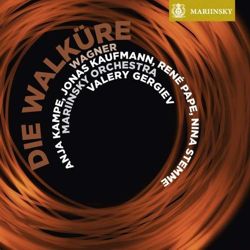|
|
|
|
|
|
|
|
|
Opera UK, May 2013 |
| Hugo Shirley |
|
|
|
Die Walküre, Wagner |
|
| |
 Three
years after the release of their Parsifal, here comes Die Walküre from
Gergiev and his Maryinsky forces, the first instalment of a projected Ring
cycle, recorded in the Maryinsky Concert Hall, which similarly mixes
international principals with home-grown singers. And in this case those
principals are perhaps even starrier. Rene Pape returns, here as
Wotan; he is joined by Jonas Kaufmann as Siegmund and Nina Stemme as an
unusually human, rich-voiced Brünnhilde, both of whom are likely to top
anyone's list for their roles today. Anja Kampe's Sieglinde is
highly committed and powerfully sung, even if the sound can become a bit
squally (the climactic 'O hehrste Wonne' in Act 3 is marred by some
pronounced vibrato). Three
years after the release of their Parsifal, here comes Die Walküre from
Gergiev and his Maryinsky forces, the first instalment of a projected Ring
cycle, recorded in the Maryinsky Concert Hall, which similarly mixes
international principals with home-grown singers. And in this case those
principals are perhaps even starrier. Rene Pape returns, here as
Wotan; he is joined by Jonas Kaufmann as Siegmund and Nina Stemme as an
unusually human, rich-voiced Brünnhilde, both of whom are likely to top
anyone's list for their roles today. Anja Kampe's Sieglinde is
highly committed and powerfully sung, even if the sound can become a bit
squally (the climactic 'O hehrste Wonne' in Act 3 is marred by some
pronounced vibrato).
Ekaterina Gubanova is the better of the two
Russian principals, her Fricka beautifully focused, noble and immoveable;
Mikhail Petrenko's Hunding, not helped by accented German, strikes me as a
little woolly and generic. The Valkyries are a lively, full-voiced bunch.
It is surprising, then, that the set only rarely adds up to a compelling
experience. And the blame must largely lie with Gergiev, whose reading,
admirably considered and detailed though it is, is surprisingly undramatic.
The first act comes off worst, with tempos too often feeling a
little cautious, and any erotic charge created by Kaufmann (in excellent
voice, and enunciating the text beautifully) and Kampe routinely neutralized
as Gergiev holds back, occasionally introducing additional little pauses,
too. He doesn't stint on Wagner's sehr schnell' at 'Siegmund heiss'
ich', but it's a bit late by then. Matters improve for Act 2, but the big
confrontation between Fricka and Wotan seems short on tension, and the
transition to the third scene lacks urgency. Gergiev's approach pays
off in a slow-burning Todesverkündigung, with Kaufmann making sure
Siegmund's moment of resolution registers powerfully. In Act 3,
Pape is more than capable of sustaining the phrases of 'Des Augen
leuchtendes Paar' at the slow tempo Gergiev takes, while suddenly the Magic
Fire music, dispatched with glittering virtuosity, is a notch faster than
one often hears.
The playing of the orchestra is of consistently fine
quality (the principal trumpet is particularly excellent), and it's rare to
hear Wotan and Brünnhilde sung as musically as they are by Pape and Stemme,
but, despite their exemplary vocalism, neither manages to communicate a
great deal in way of incisive, engrossing drama. Such a sense might be a
result of the work having been recorded in three three-evening spans over
the best part of a year. It is not helped, either, by engineering that too
often makes the orchestra sound constricted (although, strangely, the upper
winds are unnaturally vivid in the Ride of the Valkyries), makes Pape's
voice sound underwhelming and gives the other voices too little space—I
struggled to find a volume that sounded natural for all the elements in
play. Ultimately, though, it is Gergiev's strangely reticent approach that
leaves this Walküre, for all its considerable virtues, feeling rather tepid.
|
|
|
|
|
|
|
|
|
|
|
|
|
|
|
|
|
|
|